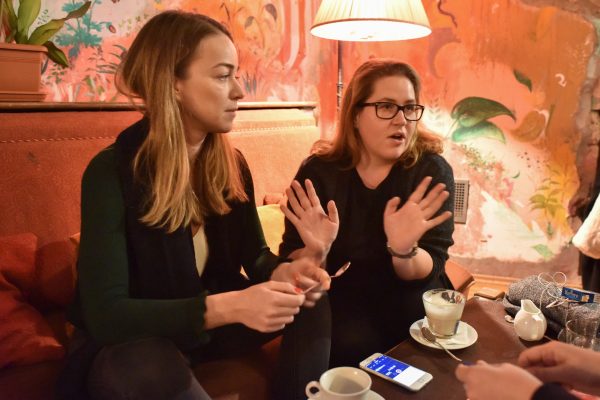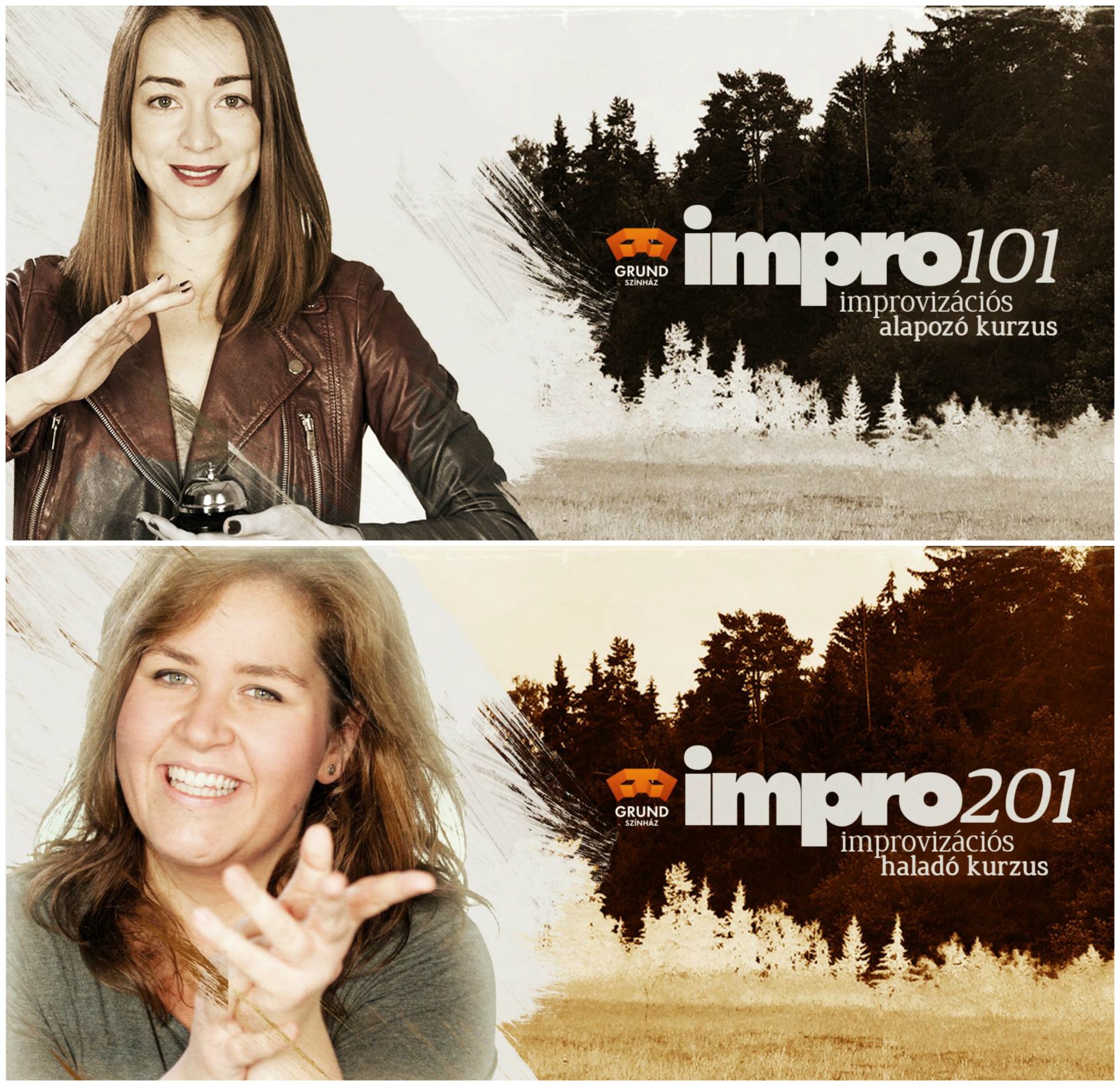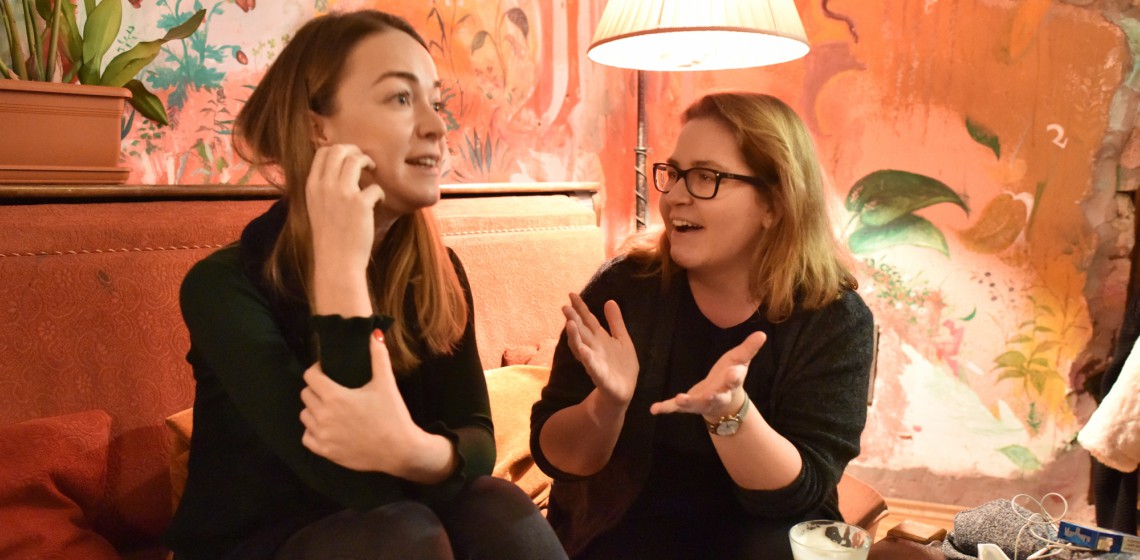Two women arrive at the home of one of them on their date. They are having a pleasant conversation that slowly reveals much about them and their relationships, both with each other and the ones close to them. Nóra Palkovits and Sára Luca Boncsér, actors of Grund Theatre perform in I’m taking you home improvisational play in Lumen every month, the next one will be on 21st January, 7pm. We met them to talk about the play, acceptance, improvisation and they also revealed that you can even attend their improvisational courses.
Would you introduce each other to the readers?
Nóra: Sári is an outstanding artist who is also good at teaching. She holds wide-ranging trainings from improvisational play to communication (in civil life). Also, she is constantly training and challenging herself, my favorite fact is that she is learning to play the piano and surprise: she is great at it! She has an eternal sense of beauty which is no wonder as she mastered in aesthetics.
Sára: It must be very exciting to be in Nóri’s skin because she works at various fields that she is able to connect as she is very good at seeing the point and context. She is primarily a psychologist and within that she is investigating how improvisation can serve as a therapy technique. It’s inspiring that Nóri is constantly learning, now she is attending university. She likes what she does and she is self-identical with her research. The civil Nóri is the person whom I would dare to do anything with, there is nothing I would be ashamed of in front of her.
If you had to describe what I’m taking you home means to you in three words, what would you say?
Sára: Partnership, being lighthearted, concentration.
Nóra: Honest, ethereal trust. But actually, it’s Boncsér Sára Luca. (laughs)
I’m taking you home is an improvisational theater performance. If you had to recommend it to someone who’s never seen improv before, how would you introduce it?
Nóra: I wouldn’t tell them that it’s improv.
Sára: I think I wouldn’t either. Lately I’ve been emphasizing that it doesn’t really matter what the audience sees, improvisation or not, because as an audience member, it doesn’t change the way of you experience it. Even if the play was scripted word by word, we would be standing here facing each other with the same concentration and techniques.
In the meantime the improv performances have a kind of specialty that some parts are so entertaining (not awkward) because as a perceiver I know this is an improvisation.
Sára: You’re right about that, and it’s good to see two actors struggling on stage, it can be an interesting aspect but I really don’t want to put the emphasis on that or to make it the most interesting part of the play. A theater performance is in the present moment, whether it has a written script or not.

Nóra: By the way, we’re talking about Ground Theater’s performance which is unique in a way that it has its own theme and form, promising a story. Most of our performances are all about improvisation though, introducing how it works. I’m taking you home is working with a theme already, combined with the improv technique.
How did the play come to life?
Nóra: I was attending university in Pécs, and we performed each year at the Pécs Psychology Days with the local improv group, Improvocal. Then I moved to Budapest and we have been called back to perform, but I was already with another group, Grund. One time, the subject was diversity, so we decided to play two women lovers instead of a male-female couple. Amnesty International really liked our play, so they supported us and made it a regular show.
Since then you have performed at Budapest Pride’s events twice. How important is it to you to help social acceptance with your play?
Sára: Just like in any other aspect of my life, it’s really important. However, we express the most acceptance with the fact that this play does not want to advertise or sugarcoat romantic relationships between women, because it is the most natural thing in the world. What’s more interesting to me is how many more different relationships can there be between two women, how they are connected. Of course it’s great if someone watching sees us being dedicated to this topic, but I think this is not what I’m the most proud of. It’s like accepting how children are born. Absurd.
Nóra: For us, acceptance is an axiom. It’s obvious. We are aware of how it might not be the case for society, but from the inside we can only work with it the same way we work with any other performance, there’s no difference. Naturally, we notice that this approach can really grab the attention of our crowd.

Sára: After the last performance, somebody came up to me and told me how happy and relieved they were that there is a play about this topic. I think this was meant for the social phenomenon that they see, how people are not entirely supportive of the topic. And although this wasn’t our goal, I am really happy if someone feels more accepted because of our performance and it makes them think about other things outside the theater, too.
Nóra: Keith Johnstone - whose technique is what Grund Theater’s work is based on - says that he mainly teaches theatrical techniques. If somebody can use it for anything else, it’s not because of him. That’s where we are when it comes to our play. We are playing with relationships and the characters are two women, so it can be a lesbian performance. It’s not what it was made for, but if it can be seen that way, that’s great.
Let’s talk about improv then! After the previous performance I noticed that the audience is mainly interested in “what percentage of it is improv”. It looks like it’s some kind of a miracle or a magic trick what you guys do and everybody wants to know how it works. So what is your answer?
Sára: This question always comes up and I always think about how to come up with a different striking answer each time. Because I can really understand the question from the audience’s point of view.
Nóra: Don’t tell them the truth, Sári! (they start laughing)

Sára: Let’s see how much of what we are talking right now is improvised. So much of it is not, because we set up a meeting through the phone, we had to dress up, because that is what society expects from us, we ordered coffee, which we will have to pay for. We know that it’s an interview and how it works is there will be questions that we will have to answer. So, many things are given, but how we are feeling right now, what the next question will be, how it will end, where I look, these we cannot know in advance. It works quite the same. Even though those 50-60 minutes of the performance require a much more extreme presence than what we have on the bus, the essence is the same.
I feel like the question is not so much about the technique, but the story itself. What is planned? You know what I mean.
Nóra: Improvisation is a technique which we can use to build a story. A story that even we don’t know before we arrive to the performance. But the techniques, like we are going to do different scenes, which we will end somehow, that the play has a start and an end, that there is music, these are things we can practice, because we will use these things on the night of the play. But we don’t know what kind of story we will be playing. This makes the situation even more exciting and vulnerable. Sometimes I look at the people on the tram with their shopping bags and I think of how much safer it would be to cook a meal at home tonight. Then I notice myself in the middle of a scene in the kitchen, chopping potatoes.
How do you rehearse for this play?
Nóra: For example, now we are working with new musicians (Pozsár Máté and Kertész Endre) and we had rehearsals with them. Other than that, we prepare with improv exercises.
Sára: Sometimes we play the scenes and talk through what happened, not analysing the story but talking about the timing, the musical support, the verbality or the physicality.
Isn’t the technical thinking a debacle in the way of the flow?
Nóra: It actually helps the flow.
Sára: I always take a musical example to explain this. In order to be able to improvise on an instrument, to get in the flow, you have to know your instrument from the inside out. If you don’t know how a piano works, I can hardly imagine you getting in the state of the flow. You have to have the technique in you, to improvise something that others can enjoy watching. However, in theater it is much less concrete than in music, since we are our own instrument: our body, our verbality, our feelings. It’s hard to explain when we are sitting at a table.
Nóra: This form of improvisation is more of a state than lexical knowledge. It doesn’t work with practised thoughts or forms, but with existing in the present moment.

If somebody’s interested in Grund Theater’s other improv performances besides I’m taking you home, what options do they have?
Sára: Well I have a solo performance called All About Palkovits Nóra. (laughs) Jokes aside, we have a vaudeville play with many small, unconnected scenes, it’s called Maestro, where the actors are competing with each other for the title of Maestro, and the audience decides who the winner is. We have a play called Cagematch, where the actors are competing in teams of 3-4-5, each team gets 25-25 minutes on the stage where we tell a more or less connected storyline. We play both of them at Budapest Jazz Club once a month.
Nóra: Then we have Food Film Fighters, it’s a cinematic themed performance that we play at Toldi. It’s directed by Andrew Hefler, the director of Grund Theatre. The theme is always a movie, but neither the actors nor the viewers know which one it is. We have slammers arriving as partners who know about the movie, and they slam about it (or slam something inspired by it), and Andrew directs the actors to play scenes that are somehow connected to the movie. The game is, the audience has to guess which film it is about. And our other performance, Sőt! is an experimental play where we try all the different methods we have used before, it can be watched in Jurányi.
So what if somebody gets inspired to try improv?
Nóra: We have an open workshop every Wednesday at 6 pm at Púder Bar, where we are currently sitting, and the day of our interview is Wednesday, too, so the training is about to start soon. We welcome everyone here who is interested in improv techniques, even for just one occasion. We also have a beginner course of 6+1 classes which is called 101 held by Sári, we expect people who have never tried improvisation before.
Sára: And we have an advanced course of 6+1 classes too, called 201 run by Nóri for those who had completed our 101 course.

Who do you recommend the courses for?
Nóra: No qualifications are required, only some time and spirit that someone can sacrifice, because improvisation doesn’t only help stage presence, it also improves many qualities that we can use in our everyday lives, such as cooperation and spontaneity.
Sára: Not even the spirit, you don’t need that, I would love to see someone who’s not in the mood come and see how they like it.

